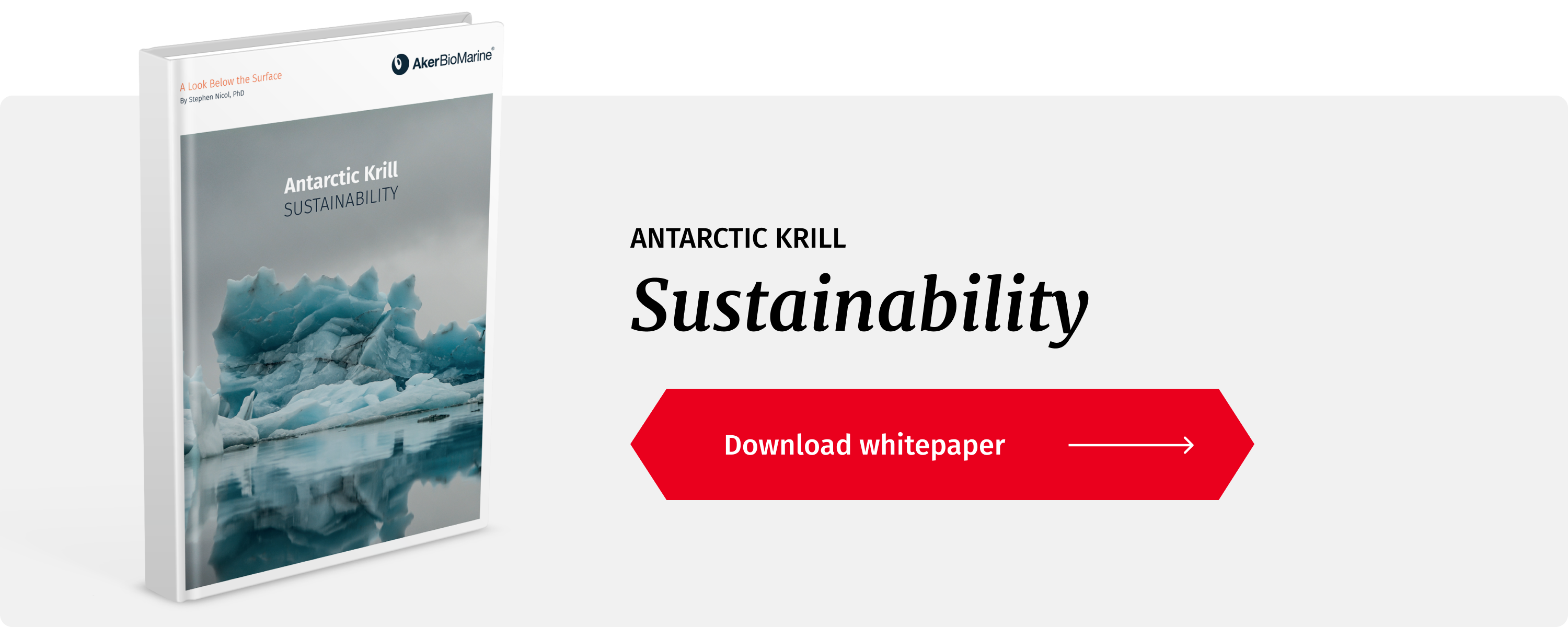Last week, Runa Haug Khoury, our Director of Sustainability, was interviewed by
IntraFish about driving sustainability further in the Antarctic region. Read the full interview below.
IntraFish about driving sustainability further in the Antarctic region. Read the full interview below.
Rather than avoid debate, the company comes to the table with critics to drive sustainability further in the Antarctic region, sustainability exec told IntraFish.
Norwegian biotech and Antarctic krill-harvesting company Aker BioMarine's recently appointed Sustainability Director Runa Haug Khoury told IntraFish dialogue and diplomacy are at the core of the company's operations as they navigate a biologically and politically sensitive fishery.
"There is a strong dialogue and interest among stakeholders to protect larger parts of Antarctica as a Marine Protected Area (MPA) and the dialogue is a part of our operational reality every day," Khoury said.
"There is a strong dialogue and interest among stakeholders to protect larger parts of Antarctica as a Marine Protected Area (MPA) and the dialogue is a part of our operational reality every day," Khoury said.
"Krill is at the bottom of the value chain so in itself it is something that requires great caution, but secondly we operate in the Antarctic waters which are deemed very pristine."
At the moment, the krill fishery -- one of the world's reduction fisheries -- is performing well, and is considered by many to be sustainably managed: it is highly regulated by the Convention for the Conservation of Antarctic Marine Living Resources (CCAMLR), which have set annual catch limits of 1 percent of the entire stock.
Aker BioMarine, who harvests the fishery with midwater trawls, sees a lot of leeway for extracting value within the bounds of that quota, however, Khoury said.
Read more about the partners we are working together with to ensure sustainable practices here.
There is a strong dialogue and interest among stakeholders to protect larger parts of Antarctica as a Marine Protected Area (MPA) and the dialogue is a part of our operational reality every day
Aker aimed at science
Even with the general concerns over harvesting krill, NGOs have been impressed with the regulatory regime for the species. Aker Biomarine applied for the fishery to be certified to the Marine Stewardship Council (MSC) standard in 2008, and the fishery was granted certification in 2010. The certification is valid for three of Aker's vessels: the Antarctic Sea, the Saga Sea and the newly built Antarctic Endurance
The fishery has other eco-kudos: NGO Sustainable Fisheries Partnership has continuously given the Antarctic krill fishery an "A" ranking because of the strong precautionary approach taken by regulatory authorities but also because of the transparency the small fleet offers.
The science behind the fishery's management continues to be a cornerstone of the company's strategy.
"Strengthening the knowledge base and science base in Antarctica is central to us and it is also very relevant for the company to contribute to increasing the understanding of the fishery's context," Khoury said.
Among its commitments to increasing that knowledge base, Aker supports the multi-stakeholder group Antarctic Wildlife Research Fund in its efforts to study the ecosystem in the Antarctic area.
Internal industrial debate
Aker maintains a continuous dialogue with the NGO community on how to actually define an MPA, and how it would apply to Antarctic waters. Greenpeace led a campaign criticising the krill fishery last year, which took its toll on Aker BioMarine in some markets.
The debate led to a discussion on creating voluntary restrictive zones within Aker BioMarine's actual harvest areas, which curbed the company from harvesting in the area during penguin breeding seasons.
"This is not something we were obliged to do but it's something that we have voluntarily agreed to and we have managed to get other companies to follow through with it," Khoury said.
The company took the position in recent years to become more collaborative with MPA interests.
"We don't fight them, instead we operate alongside them and leading fishery companies need to play along with the broader interests of protecting the ocean to become a well-positioned firm in the future," Khoury told IntraFish.
The beauty lies in owning our whole value chain from vessels, to logistics, to the factory, which allows us to improve ourselves across the value chain.
Benefits of integration
Aker BioMarine has small and big plans throughout the value chain and as sustainability director, Khoury sees the company's vertical integration as its biggest asset in producing a sustainable product.
"The beauty lies in owning our whole value chain from vessels, to logistics, to the factory, which allows us to improve ourselves across the value chain," she said.
Those improvements come at a price: the company has future goals to reduce vessel emissions as well as increasing tested technology, even though they could be costly choices.
Read more about how Antarctic krill fishery is one of the most sustainable managed in the world by downloading the whitepaper below.

